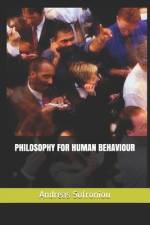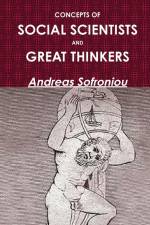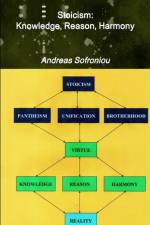av Andreas Sofroniou
281
It is believed that the subject of philosophy; being wise, offering advice, guidance and in general, counselling people in modern times has become a profession in its own right. With this in mind, this book hopes to address an important alternative in understanding the homo-sapiens' behaviour and the personal discomforts in living as an individual and in groups, whatever the choice may be.The content of this book will still be of importance to the reader and without any compromising, a training tool for the behaviourist. There is no doubt that this subject is deep and vast. Backed by recent social events and political debating, philosophy in its plentiful branches can only be helpful in preparing people to obtain an acceptable style of living and a harmonious mode of interacting with society.The book concentrates on the historical established concepts and didactics of philosophers through the ages, from the Hellenic rhetoric, to recent European schools of ideas. All the teachings of philosophers and sophists explain the right of a person to live as a politis (citizen) in a near enough democratic state. The right to integrate and in doing so to live as an entity with his/her own attributes and behaviour within a society. In doing so, philosophers have debated the morals, norms, laws, beliefs, religions and logically enough what can be an acceptable pattern of attitudes within the parameters of social tolerance.Philosophers through the aeons have advised and counselled on the upbringing of children and offered guidance in establishing the right relationship between the child, the parents and the state. More recently, analytical philosophies such as the neo-Freudian and Jungian schools established the methods of treating people, based on the classical idealism, with Socrates probably being the father of the method of question and answer. Sophocles, through his surviving tragedies, is certainly the major contributor to the psycho-analytical Oedipus and Electra complexes and perhaps the biggest influence on Freud and his successors. Modern philosophical concepts have grown into such a vast amount of schools of ideas that patients and clients are often confused as to what they should follow. Institutions with therapy as a profession in mind, offer qualifications for so many types of therapies; Counselling, Psychotherapy, Hypnotherapy, Cognitive, Behavioural, Rogerian, Adlerian, Jungian psychotherapy, Freudian psycho-analysis, Psycho-dynamic, Eclectic, Client-centred, Psycho-drama, Group Therapy, Psychiatry, Clinical Psychology, Medical Psychology, Transactional Analysis, Developmental Psychology, Analytical... Branches of philosophy (just as much as Social Philosophy and Political Philosophy) maintain closer links with the constitution of the individual and groups of people living together, simply because a human being all along bears with himself/herself the philosophy of the environment they live in; the beliefs and the philosophy established through the ages. What a better way to treat a human being, other than the use of the logic as taught by the traditional philosopher and as followed by the individual seeking assistance with the understanding of his/her nature?Philosophical thoughts have been with us since the times of the olden. As such, this book includes the ideas of Plato, Aristotle, Machiavelli, Hobbes, Locke, Rousseau, Hume, Burke, Hegel, Bentham, Mill, Marx and the other philosophers in contemporary therapies. The logic expressed by these and other philosophers can only assist in the understanding of human behaviour and in cases where necessary, the way in which philosophy can contribute to the treatment of the individual.






























